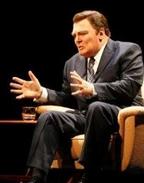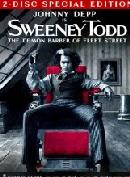HOME PAGE
SITE GUIDE
SEARCH
ADVERTISING AT CURTAINUP
REVIEWS
FEATURES
NEWS
Etcetera and
Short Term Listings
LISTINGS
Broadway
Off-Broadway
NYC Restaurants
BOOKS and CDs
OTHER PLACES
Berkshires
London
California
New Jersey
Philadelphia
Elsewhere
QUOTES
TKTS
PLAYWRIGHTS' ALBUMS
LETTERS TO EDITOR
FILM
LINKS
MISCELLANEOUS
Free Updates
Masthead
Writing for Us
A CurtainUp Los Angeles Review
Frost/Nixon
| Success in America is unlike success anywhere else.— David Frost I'm saying that when the President does it, that means it's not illegal. . .I realize no one else shares that view. Richard Nixon |

Stacy Keach as Nixon
(Photo: Carol Rosegg) |
The story is told from the point of view of television host David Frost, who wanted to regain his place in the sun by parlaying interviews with disgraced President Richard Nixon, whose resignation was instigated by his complicity in break-ins to the Democrats' offices at Watergate. Both versions are riveting but the play, with its peeled-down staging illuminated only by video projections on the back wall, has a power that the film which, necessarily, breaks the fourth wall lacks. This is a people story and the film's shots of airports, hotel rooms and Nixon's villa on the Pacific soften and colorize that.
Peter Morgan calls his play a fiction though, of course, it's based on the verbatim Frost/Nixon interviews. Morgan does better at probing the depths of Nixon's character, particularly in the late night phone call he's given him. After countless drinks, Nixon phones Frost's hotel and rambles on about the similarity in their backgrounds, both poor boys who were always silkily despised by the Establishment, no matter how high they rose. Frost doesn't respond in kind but we get a glimpse of his feelings when, after hanging up, he barks at his girlfriend who has just returned with Room Service that he has to work.
This fictional motivation adds heft to Frost's ultimate attack-dog approach, fueled by the transcripts of the Colson/Nixon phone tapes James Reston just dug up which reveal that Nixon knew about the Watergate break-in. Although "I let the people down"may be the closest Nixon ever gets to an apology, his astounding statement that when the President does it, it's not illegal reveals the nature of the man. Morgan uses the search for truth to make this a suspense play, skillfully building to its climactic moment.
His crisp dialogue finds moments of humor as do his leading men. Neither bears any physical resemblance to his character but Stacy Keach as Nixon has the voice down pat. He also brings heft and a fathomless despair to the character. Alan Cox as Frost is dapper, confident and the kind of young playboy that Nixon can only wistfully envy. Brian Sgambati brings a youthful forcefulness to James Reston who also serves as Narrator in the beginning and is a more prominent character in the play than in the film. Stephen Rowe in the dual role of Swifty Lazar and Mike Wallace diversifies each with panache.
Morgan's play is also a play about another medium, television, which has changed the world and slyly illustrates how Frost, a young man in a young industry, has learned to master it.
For a review of of the play in London and on Broadway go here.
|
Frost/Nixon Playwright: Peter Morgan Director: Michael Grandage Cast: Stacy Keach (Richard Nixon), Brian Sgambati (Jim Reston), Alan Cox (David Frost), Ted Koch (Jack Brennan), Meghan Andrews (Evonne Goolagong), Anthony Hagopian (John Birt), Noel Velez (Manolo Sanchez), Stephen Rowe (Swifty Lazar/Mike Wallace), Roxanna Hope (Caroline Cushing), Bob Ari (Bob Zelnick), Peter Hilton, Tamara Lovatt-Smith, David Sitler (Ensemble) Set and Costume Design: Christopher Oram Lighting Design: Neil Austin Production Stage Manager: J. P. Elins Composer and Sound Designer: Adam Cork Video Designer: Jon Driscoll Hair and Wig Designer: Richard Mawbrey Running Time: Two hours, no intermission Running Dates: March 11-29, 2009 Where: The Ahmanson Theatre, 135 N. Grand St., Los Angeles. Reservations: (213) 628-2772. Reviewed by Laura Hitchcock on March 12, 2009. |
|







